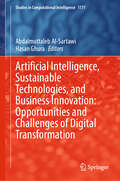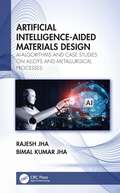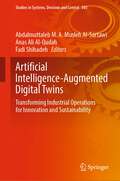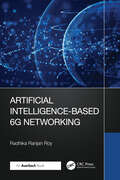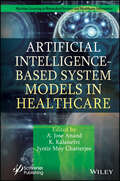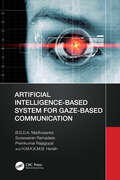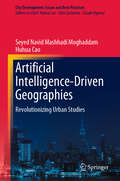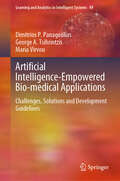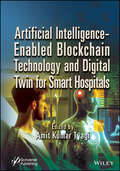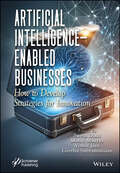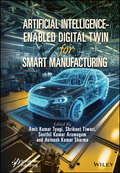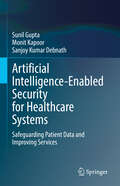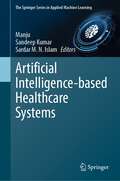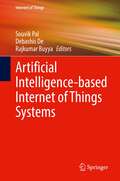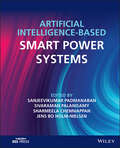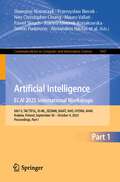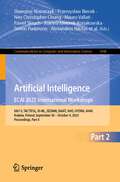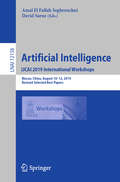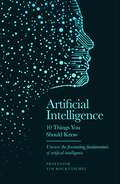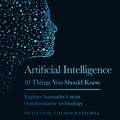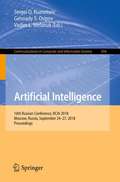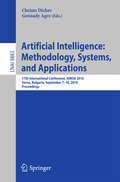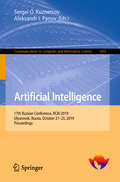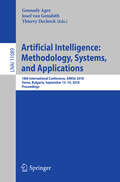- Table View
- List View
Artificial Intelligence, Sustainable Technologies, and Business Innovation: Opportunities and Challenges of Digital Transformation (Studies in Computational Intelligence #1171)
by Abdalmuttaleb Al-Sartawi Hasan GhuraThis book offers a comprehensive exploration of the symbiotic relationship between artificial intelligence, sustainable technologies, and business innovation. Innovation has always been the main engine of an improved standard of living throughout history. However, the process of innovation can be highly disruptive as it makes more conventional technologies obsolete This book presents trendy and important topics such as open innovation and sustainability of Islamic Banks, Fintech, financial inclusion, IOT, business intelligence capabilities, innovation through AI, circular economy practices, and trends in cybersecurity. The reader-base from diverse backgrounds, including scholars, industry experts, policymakers, and students, engage with the perspectives and topics discussed in this book. By understanding the opportunities and challenges of this dynamic landscape, the authors can collectively work together to shape a future where technology and sustainability co-exist to drive positive change.
Artificial Intelligence-Aided Materials Design: AI-Algorithms and Case Studies on Alloys and Metallurgical Processes
by Rajesh Jha Bimal Kumar JhaThis book describes the application of artificial intelligence (AI)/machine learning (ML) concepts to develop predictive models that can be used to design alloy materials, including hard and soft magnetic alloys, nickel-base superalloys, titanium-base alloys, and aluminum-base alloys. Readers new to AI/ML algorithms can use this book as a starting point and use the MATLAB® and Python implementation of AI/ML algorithms through included case studies. Experienced AI/ML researchers who want to try new algorithms can use this book and study the case studies for reference. Offers advantages and limitations of several AI concepts and their proper implementation in various data types generated through experiments and computer simulations and from industries in different file formats Helps readers to develop predictive models through AI/ML algorithms by writing their own computer code or using resources where they do not have to write code Covers downloadable resources such as MATLAB GUI/APP and Python implementation that can be used on common mobile devices Discusses the CALPHAD approach and ways to use data generated from it Features a chapter on metallurgical/materials concepts to help readers understand the case studies and thus proper implementation of AI/ML algorithms under the framework of data-driven materials science Uses case studies to examine the importance of using unsupervised machine learning algorithms in determining patterns in datasets This book is written for materials scientists and metallurgists interested in the application of AI, ML, and data science in the development of new materials.
Artificial Intelligence-Augmented Digital Twins: Transforming Industrial Operations for Innovation and Sustainability (Studies in Systems, Decision and Control #503)
by Abdalmuttaleb M. A. Musleh Al-Sartawi Anas Ali Al-Qudah Fadi ShihadehPresently, we stand on the threshold of a technological revolution that will drastically change the way we live, work, and communicate with each other. By the current rate, scope, and complexity, this transformation will be as fundamental for society as any other technological paradigm change from the past. The industries which are more susceptible to change are technologically oriented industries including banking, finance, accounting, and auditing. One of the technological concepts of the technological revolution is the concept of the digital twin.The application of digital twins and AI as paired with Internet of Things technologies makes it possible to solve ESG problems on a completely different level (Li, 2019) for accounting firms and financial institutions. These include recycling on demand, rational energy consumption, smart surveillance cameras for crime tracking, and smart branch parking solutions, monitoring the wear and tear and conditions of financial technology infrastructures.Moreover, numerous researchers and practitioners emphasize the significance of innovating sustainable business models and operations (Geissdoerfer et al., 2018). The digital twin will allow businesses and financial institutions to minimize costs, boost customer service, and find new ways to generate revenue. DTW is accessible now more than ever, and many reputable and innovative companies such as Tesla, Ericsson, and Siemens have adopted it with varying success.Therefore, this book examines the opportunities, challenges, and risks of artificial intelligence-augmented digital twins for financial operations, innovation, and sustainable development. It focuses on AI and digital twin technologies to furnish solutions for the current industrial revolution including the Metaverse. Henceforth, this book aims to encourage authors to submit multi-disciplinary chapters indicating the current scholarly challenges about the applications and potential of artificial intelligence and digital twins in accounting, finance, and banking.
Artificial Intelligence-Based 6G Networking
by Radhika Ranjan RoyArtificial Intelligence-Based 6G Networking focuses exclusively on the upcoming sixth-generation (6G) network and services slated for implementation by 2030. It explores the paradigm shift that is 6G. It discusses the deep integration of computing and communication, supported by artificial intelligence (AI) across network elements like cloud, edge, and terminals. It also examines how AI-native interfaces will permeate various network components, from radio access networks to application servers and databases.Proposing a unified AI-enabled framework for optimizing networks and applications as a single integrated system, the book covers how network service providers can tailor network baselines, reduce noise, and accurately identify issues. The book delves into the potential of AI-driven networks to self-correct, predict, and rectify service degradations proactively, enhancing uptime and troubleshooting efficiency. It outlines the “Connection, Communication, Collaboration, Curation, and Community” framework to enhance network effects, aiding operators in automation, cost reduction, and providing optimal user experiences.Covering topics from MIMO and Massive MIMO to holographic communications, cybersecurity and quantum communications, the book explores cutting-edge technologies shaping the future of 6G networks. It anticipates a future where AI, along with machine learning and deep learning, enables continuous learning, self-optimization, and predictive maintenance, even with full automation, that will be the hallmark of a new era in network connectivity and innovation.
Artificial Intelligence-Based System Models in Healthcare
by K. Kalaiselvi A. Jose Anand Jyotir Moy ChatterjeArtificial Intelligence-Based System Models in Healthcare provides a comprehensive and insightful guide to the transformative applications of AI in the healthcare system. This book is a groundbreaking exploration of the synergies between artificial intelligence and healthcare innovation. In an era where technological advancements are reshaping the landscape of medical practices, this book provides a comprehensive and insightful guide to the transformative applications of AI in healthcare systems. From conceptual foundations to practical implementations, the book serves as a roadmap for understanding the intricate relationships between AI-based system models and the evolution of healthcare delivery. The first section delves into the fundamental role of technology in reshaping the healthcare landscape. With a focus on daily life activities, decision support systems, vision-based management, and semantic frameworks, this section lays the groundwork for understanding the pivotal role of AI in revolutionizing traditional healthcare approaches. Each chapter offers a unique perspective, emphasizing the intricate integration of technology into healthcare ecosystems. The second section takes a deep dive into specific applications of AI, ranging from predictive analysis and machine learning to deep learning, image analysis, and biomedical text processing. With a focus on decision-making support systems, this section aims to demystify the complex world of AI algorithms in healthcare, offering valuable insights into their practical implications and potential impact on patient outcomes. The final section addresses the modernization of healthcare practices and envisions the future landscape of AI applications. From medical imaging and diagnostics to predicting ventilation needs in intensive care units, modernizing health record maintenance, natural language processing, chatbots for medical inquiries, secured health insurance management, and glimpses into the future, the book concludes by exploring the frontiers of AI-driven healthcare innovations. Audience This book is intended for researchers and postgraduate students in artificial intelligence and the biomedical and healthcare sectors. Medical administrators, policymakers and regulatory specialists will also have an interest.
Artificial Intelligence-Based System for Gaze-Based Communication
by Premkumar Rajagopal B.G.D.A. Madhusanka Sureswaran Ramadass H.M.K.K.M.B. HerathThis book focuses on the artificial neural network-based system for gaze-based communication. It covers the feasible and practical collaboration of human–computer interaction (HCI) in which a user can intuitively express tasks using gaze-based communication. It will target the vast applications of gaze-based communication using computer vision, image processing, and artificial intelligence.Artificial Intelligence-Based System for Gaze-Based Communication introduces a novel method to recognize the implicit intention of users by using nonverbal communication in combination with computer vision technologies. A novel HCI framework is developed to enable implicit and intuitive gaze-based intention communications. This framework allows the users to intuitively express their intention using natural gaze cues. The book also focuses on robot caregiving technology, which can understand the user’s intentions using minimal interactions with the user. The authors examine gaze-based tracking applications for the assisted living of elderly people. The book examines detailed applications of eye-gaze communication for real-life problems. It also examines the advantages that most people can handle gaze-based communications because it requires very little effort, and most of the elderly and impaired can retain visual capability.This book is ideally designed for students, researchers, academicians, and professionals interested in exploring and implementing gaze-based communication strategies and those working in the field of computer vision and image processing.
Artificial Intelligence-Driven Geographies: Revolutionizing Urban Studies (City Development: Issues and Best Practices)
by Huhua Cao Seyed Navid MoghaddamThis groundbreaking book delves deep into the history of AI, the major techniques and algorithms of machine learning and deep learning, and the critical role of data sources and processing in these disciplines. It covers a range of AI applications in human geography, including population distribution, land use, environmental risk assessment, and socioeconomic analysis. In urban planning, the book explores AI-driven approaches to smart cities, transportation management, urban growth prediction, and sustainable development, among others. As AI continues to permeate every aspect of human life, it is essential to understand and address the ethical considerations and challenges associated with AI-driven planning. This book tackles crucial issues such as data privacy, algorithmic bias, equitable access to technology, and the future of employment in the fields of geography and urban planning. In addition, it presents inspiring case studies, highlighting successful AI applications in human geography and urban planning, and offers insights into future research directions and challenges. This book is a must-read for students, researchers, and professionals in geography, urban planning, environmental studies, and related fields. It is also an invaluable resource for policymakers and urban planners seeking to leverage the power of AI to create smarter, more sustainable, and equitable cities and communities. This book equips you with the knowledge and tools to harness the potential of AI, leading the way to a better understanding of our world and a brighter future for all.
Artificial Intelligence-Empowered Bio-medical Applications: Challenges, Solutions and Development Guidelines (Learning and Analytics in Intelligent Systems #49)
by Maria Virvou George A. Tsihrintzis Dimitrios P. PanagouliasThe book delves into advancements in personalized medicine, highlighting the transition from generalized treatments to tailored strategies through AI and machine learning. It first emphasizes the role of biomarkers in training predictive models and neural networks, enhancing disease diagnosis and patient management. It then explores AI-driven healthcare systems, particularly the use of microservices to improve scalability and management. Additionally, it examines regulatory challenges, the need for AI explainability, and the PINXEL framework, which defines explainability requirements using the technology acceptance model (TAM) and the diffusion of innovation theory (DOI). Furthermore, the book evaluates the capabilities of large language models, including ChatGPT and GPT-4V, in medical applications, with a focus on diagnosis and structured assessments in general pathology. Lastly, it introduces an AI-powered system for primary care diagnosis that integrates language models, machine learning, and rule-based systems. The interactive AI assistants &“Med|Primary AI assistant&” and &“Dermacen Analytica&” leverage natural language processing, image analysis, and multi-modal AI to enhance patient interactions and provide healthcare professionals with high-accuracy, personalized diagnostic support. By taking a holistic approach, the book underscores the integration of AI into healthcare, aiming to support medical professionals in patient diagnosis and management with precision and adaptability.
Artificial Intelligence-Enabled Blockchain Technology and Digital Twin for Smart Hospitals
by Amit Kumar TyagiThe book uniquely explores the fundamentals of blockchain and digital twin and their uses in smart hospitals. Artificial Intelligence-Enabled Blockchain Technology and Digital Twin for Smart Hospitals provides fundamental information on blockchain and digital twin technology as effective solutions in smart hospitals. Digital twin technology enables the creation of real-time virtual replicas of hospital assets and patients, enhancing predictive maintenance, operational efficiency, and patient care. Blockchain technology provides a secure and transparent platform for managing and sharing sensitive data, such as medical records and pharmaceutical supply chains. By combining these technologies, smart hospitals can ensure data security, interoperability, and streamlined operations while providing patient-centered care. The book also explores the impact of collected medical data from real-time systems in smart hospitals, and by making it accessible to all doctors via a smartphone or mobile device for fast decisions. Inevitable challenges such as privacy concerns and integration costs must, of course, be addressed. However, the potential benefits in terms of improved healthcare quality, reduced costs, and global health initiatives makes the integration of these technologies a compelling avenue for the future of healthcare. Some of the topics that readers will find in this book include: Wireless Medical Sensor Networks in Smart Hospitals ● DNA Computing in Cryptography ● Enhancing Diabetic Retinopathy and Glaucoma Diagnosis through Efficient Retinal Vessel Segmentation and Disease Classification ● Machine Learning-Enabled Digital Twins for Diagnostic And Therapeutic Purposes ● Blockchain as the Backbone of a Connected Ecosystem of Smart Hospitals ● Blockchain for Edge Association in Digital Twin Empowered 6G Networks ● Blockchain for Security and Privacy in Smart Healthcare ● Blockchain-Enabled Internet of Things (IoTs) Platforms for IoT-Based Healthcare and Biomedical Sector ● Electronic Health Records in a Blockchain ● PSO-Based Hybrid Cardiovascular Disease Prediction for Using Artificial Flora Algorithm ● AI and Transfer Learning Based Framework for Efficient Classification And Detection Of Lyme Disease ● Framework for Gender Detection Using Facial Countenances ● Smartphone-Based Sensors for Biomedical Applications ● Blockchain for Improving Security and Privacy in the Smart Sensor Network ● Sensors and Digital Twin Application in Healthcare Facilities Management ● Integration of Internet of Medical Things (IoMT) with Blockchain Technology to Improve Security and Privacy ● Machine Learning-Driven Digital Twins for Precise Brain Tumor and Breast Cancer Assessment ● Ethical and Technological Convergence: AI and Blockchain in Halal Healthcare ● Digital Twin Application in Healthcare Facilities Management ● Cloud-based Digital Twinning for Structural Health Monitoring Using Deep Learning. Audience The book will be read by hospital and healthcare providers, administrators, policymakers, scientists and engineers in artificial intelligence, information technology, electronics engineering, and related disciplines.
Artificial Intelligence-Enabled Businesses: How to Develop Strategies for Innovation
by Vishal Jain Mohit Maurya Sweta Dixit Geetha SubramaniamThis book has a multidimensional perspective on AI solutions for business innovation and real-life case studies to achieve competitive advantage and drive growth in the evolving digital landscape. Artificial Intelligence-Enabled Businesses demonstrates how AI is a catalyst for change in business functional areas. Though still in the experimental phase, AI is instrumental in redefining the workforce, predicting consumer behavior, solving real-life marketing dynamics and modifications, recommending products and content, foreseeing demand, analyzing costs, strategizing, managing big data, enabling collaboration of cross-entities, and sparking new ethical, social and regulatory implications for business. Thus, AI can effectively guide the future of financial services, trading, mobile banking, last-mile delivery, logistics, and supply chain with a solution-oriented focus on discrete business problems. Furthermore, it is expected to educate leaders to act in an ever more accurate, complex, and sophisticated business environment with the combination of human and machine intelligence. The book offers effective, efficient, and strategically competent suggestions for handling new challenges and responsibilities and is aimed at leaders who wish to be more innovative. It covers the early stages of AI adoption by organizations across their functional areas and provides insightful guidance for practitioners in the suitable and timely adoption of AI. This book will greatly help to scale up AI by leveraging interdisciplinary collaboration with cross-functional, skill-diverse teams and result in a competitive advantage. Audience This book is for marketing professionals, organizational leaders, and researchers to leverage AI and new technologies across various business functions. It also fits the needs of academics, students, and trainers, providing insights, case studies, and practical strategies for driving growth in the rapidly evolving digital landscape.
Artificial Intelligence-Enabled Digital Twin for Smart Manufacturing
by Amit Kumar Tyagi Shrikant Tiwari Senthil Kumar Arumugam Avinash Kumar SharmaAn essential book on the applications of AI and digital twin technology in the smart manufacturing sector. In the rapidly evolving landscape of modern manufacturing, the integration of cutting-edge technologies has become imperative for businesses to remain competitive and adaptive. Among these technologies, Artificial Intelligence (AI) stands out as a transformative force, revolutionizing traditional manufacturing processes and making the way for the era of smart manufacturing. At the heart of this technological revolution lies the concept of the Digital Twin—an innovative approach that bridges the physical and digital realms of manufacturing. By creating a virtual representation of physical assets, processes, and systems, organizations can gain unprecedented insights, optimize operations, and enhance decision-making capabilities. This timely book explores the convergence of AI and Digital Twin technologies to empower smart manufacturing initiatives. Through a comprehensive examination of principles, methodologies, and practical applications, it explains the transformative potential of AI-enabled Digital Twins across various facets of the manufacturing lifecycle. From design and prototyping to production and maintenance, AI-enabled Digital Twins offer multifaceted advantages that redefine traditional paradigms. By leveraging AI algorithms for data analysis, predictive modeling, and autonomous optimization, manufacturers can achieve unparalleled levels of efficiency, quality, and agility. This book explains how AI enhances the capabilities of Digital Twins by creating a powerful tool that can optimize production processes, improve product quality, and streamline operations. Note that the Digital Twin in this context is a virtual representation of a physical manufacturing system, including machines, processes, and products. It continuously collects real-time data from sensors and other sources, allowing it to mirror the physical system’s behavior and performance. What sets this Digital Twin apart is the incorporation of AI algorithms and machine learning techniques that enable it to analyze and predict outcomes, recommend improvements, and autonomously make adjustments to enhance manufacturing efficiency. This book outlines essential elements, like real-time monitoring of machines, predictive analytics of machines and data, optimization of the resources, quality control of the product, resource management, decision support (timely or quickly accurate decisions). Moreover, this book elucidates the symbiotic relationship between AI and Digital Twins, highlighting how AI augments the capabilities of Digital Twins by infusing them with intelligence, adaptability, and autonomy. Hence, this book promises to enhance competitiveness, reduce operational costs, and facilitate innovation in the manufacturing industry. By harnessing AI’s capabilities in conjunction with Digital Twins, manufacturers can achieve a more agile and responsive production environment, ultimately driving the evolution of smart factories and Industry 4.0/5.0. Audience This book has a wide audience in computer science, artificial intelligence, and manufacturing engineering, as well as engineers in a variety of industrial manufacturing industries. It will also appeal to economists and policymakers working on the circular economy, clean tech investors, industrial decision-makers, and environmental professionals.
Artificial Intelligence-Enabled Security for Healthcare Systems: Safeguarding Patient Data and Improving Services
by Sunil Gupta Monit Kapoor Sanjoy Kumar DebnathThe book "AI-Enabled Healthcare Security: Safeguarding Patient Data and Improving Outcomes" focuses on the role of artificial intelligence in enhancing healthcare security and improving patient outcomes. It covers the challenges and risks associated with cybersecurity threats in the healthcare industry and explores the use of AI-based cybersecurity solutions, machine learning algorithms, and predictive analytics to mitigate those risks. The book is intended for healthcare professionals, cybersecurity experts, AI practitioners, and anyone interested in the intersection of healthcare, cybersecurity, and AI. It also highlights emerging technologies and future trends in AI and healthcare security.
Artificial Intelligence-based Healthcare Systems (The Springer Series in Applied Machine Learning)
by Sandeep Kumar Sardar M. N. Islam ManjuThis book explores new applications in the field of science and technology for healthcare systems. The main focus of this book is to devise smart, efficient and robust solutions for the health care sector to serve the major population of rural areas. Artificial Intelligence-based Healthcare Systems encourages scientists, engineers, and scholars across the multiple disciplines to design smart intelligent innovations on rural healthcare issues and motivate to collaborate multiple ideas to design best solutions. It also helps the readers at various levels of knowledge to further enhance their understanding for new tools and smart solutions.
Artificial Intelligence-based Internet of Things Systems (Internet of Things)
by Debashis De Rajkumar Buyya Souvik PalThe book discusses the evolution of future generation technologies through Internet of Things (IoT) in the scope of Artificial Intelligence (AI). The main focus of this volume is to bring all the related technologies in a single platform, so that undergraduate and postgraduate students, researchers, academicians, and industry people can easily understand the AI algorithms, machine learning algorithms, and learning analytics in IoT-enabled technologies. This book uses data and network engineering and intelligent decision support system-by-design principles to design a reliable AI-enabled IoT ecosystem and to implement cyber-physical pervasive infrastructure solutions. This book brings together some of the top IoT-enabled AI experts throughout the world who contribute their knowledge regarding different IoT-based technology aspects.
Artificial Intelligence-based Smart Power Systems
by Jens Bo Holm-Nielsen Sanjeevikumar Padmanaban Sivaraman Palanisamy Sharmeela ChenniappanARTIFICIAL INTELLIGENCE-BASED SMART POWER SYSTEMS Authoritative resource describing artificial intelligence and advanced technologies in smart power systems with simulation examples and case studies Artificial Intelligence-based Smart Power Systems presents advanced technologies used in various aspects of smart power systems, especially grid-connected and industrial evolution. It covers many new topics such as distribution phasor measurement units, blockchain technologies for smart power systems, the application of deep learning and reinforced learning, and artificial intelligence techniques. The text also explores the potential consequences of artificial intelligence and advanced technologies in smart power systems in the forthcoming years. To enhance and reinforce learning, the editors include many learning resources throughout the text, including MATLAB, practical examples, and case studies. Artificial Intelligence-based Smart Power Systems includes specific information on topics such as: Modeling and analysis of smart power systems, covering steady state analysis, dynamic analysis, voltage stability, and more Recent advancement in power electronics for smart power systems, covering power electronic converters for renewable energy sources, electric vehicles, and HVDC/FACTs Distribution Phasor Measurement Units (PMU) in smart power systems, covering the need for PMU in distribution and automation of system reconfigurations Power and energy management systems Engineering colleges and universities, along with industry research centers, can use the in-depth subject coverage and the extensive supplementary learning resources found in Artificial Intelligence-based Smart Power Systems to gain a holistic understanding of the subject and be able to harness that knowledge within a myriad of practical applications.
Artificial Intelligence. ECAI 2023 International Workshops: XAI^3, TACTIFUL, XI-ML, SEDAMI, RAAIT, AI4S, HYDRA, AI4AI, Kraków, Poland, September 30 – October 4, 2023, Proceedings, Part I (Communications in Computer and Information Science #1947)
by Eunika Mercier-Laurent Michael Kohlhase Abdul Wahid Francesco Calimeri Gülgün Kayakutlu Simon Parkinson Paweł Skruch Vania Dimitrova Jochen L. Leidner Ute Schmid Mauro Vallati Diedrich Wolter Tomáš Kliegr Mieczyslaw Lech Owoc Giorgio Terracina Sławomir Nowaczyk Przemysław Biecek Neo Christopher Chung Joanna Jaworek-Korjakowska Alexandros Nikitas Martin Atzmüller Szymon Bobek Nada Lavrac Marieke Peeters Roland Van Dierendonck Saskia Robben Karl Mason Pierangela Bruno Francesco CauteruccioThis volume constitutes the refereed proceedings presented at the international workshops of the 26th European Conference on Artificial Intelligence, ECAI 2023, which was held in Kraków, Poland, in September-October 2023. The papers in this volume were presented at the following workshops: XAI^3, TACTIFUL, XI-ML, SEDAMI, RAAIT, AI4S, HYDRA, AI4AI.
Artificial Intelligence. ECAI 2023 International Workshops: XAI^3, TACTIFUL, XI-ML, SEDAMI, RAAIT, AI4S, HYDRA, AI4AI, Kraków, Poland, September 30 – October 4, 2023, Proceedings, Part II (Communications in Computer and Information Science #1948)
by Eunika Mercier-Laurent Michael Kohlhase Abdul Wahid Francesco Calimeri Gülgün Kayakutlu Simon Parkinson Paweł Skruch Vania Dimitrova Jochen L. Leidner Ute Schmid Mauro Vallati Diedrich Wolter Tomáš Kliegr Mieczyslaw Lech Owoc Giorgio Terracina Sławomir Nowaczyk Przemysław Biecek Neo Christopher Chung Joanna Jaworek-Korjakowska Alexandros Nikitas Martin Atzmüller Szymon Bobek Nada Lavrac Marieke Peeters Roland Van Dierendonck Saskia Robben Karl Mason Pierangela Bruno Francesco CauteruccioThis volume constitutes the refereed proceedings presented at the international workshops of the 26th European Conference on Artificial Intelligence, ECAI 2023, which was held in Kraków, Poland, in September-October 2023. The papers in this volume were presented at the following workshops: XAI^3, TACTIFUL, XI-ML, SEDAMI, RAAIT, AI4S, HYDRA, AI4AI.
Artificial Intelligence. IJCAI 2019 International Workshops: Macao, China, August 10–12, 2019, Revised Selected Best Papers (Lecture Notes in Computer Science #12158)
by Amal El Fallah Seghrouchni David SarneThis book presents selected papers of 12 Workshops held in conjunction with the 28th International Joint Conference on Artificial Intelligence, IJCAI 2019, in Macao, China, in August 2019.The workshops included in this volume are: AI4KM 2019: 7th International Workshop on Artificial Intelligence for Knowledge Management and Innovation.FinNLP 2019: First International Workshop on Financial Technology and Natural Language Processing.OR 2019: 32nd International Workshop on Qualitative Reasoning.SURL 2019: Second International Workshop on Scaling-Up Reinforcement Learning.First International Workshop on Bringing Semantic Knowledge into Vision and Text Understanding.EASyHAT 2019: First International Workshop on Evaluation of Adaptive Systems for Human-Autonomy Teaming.ACAN 2019: 12th International Workshop on Agent-based Complex Automated Negotiations.First International Workshop on Deep Learning for Human Activity Recognition.HAI 2019: Second International Workshop on Humanizing AI.International Workshop on Language Sense on Computer.AISafety 2019: International Workshop on Artificial Intelligence Safety.DeLBP 2019: 4th International Workshop on Declarative Learning Based Programming.
Artificial Intelligence: 10 Things You Should Know (10 Things You Should Know)
by Professor Tim Rocktäschel"An excellent, extremely up-to-date overview of the most important technological revolution in human history." - Prof. Jeff Clune, University of British Columbia"If I were to recommend one book on AI, this would be it!" - Dr Edward Hughes, LSE & Google DeepMindExplore humanity's most transformative technology: artificial intelligence...In ten short and informative essays, Professor of AI at University College London, Tim Rocktäschel, reveals everything we need to know about artificial intelligence. From what the futures holds for AI and why it continues to improve with more data, to how superhuman AI is attainable and why we still have to fold our own laundry, discover all of this and much, much more!Artificial Intelligence: 10 Things You Should Know is an illuminating and engaging guide to the most important area of science and technology today.
Artificial Intelligence: 10 Things You Should Know (10 Things You Should Know)
by Professor Tim Rocktäschel"An excellent, extremely up-to-date overview of the most important technological revolution in human history." - Prof. Jeff Clune, University of British Columbia"If I were to recommend one book on AI, this would be it!" - Dr Edward Hughes, LSE & Google DeepMindExplore humanity's most transformative technology: artificial intelligence...In ten short and informative essays, Professor of AI at University College London, Tim Rocktäschel, reveals everything we need to know about artificial intelligence. From what the futures holds for AI and why it continues to improve with more data, to how superhuman AI is attainable and why we still have to fold our own laundry, discover all of this and much, much more!Artificial Intelligence: 10 Things You Should Know is an illuminating and engaging guide to the most important area of science and technology today.
Artificial Intelligence: 10 Things You Should Know (10 Things You Should Know)
by Professor Tim Rocktäschel"An excellent, extremely up-to-date overview of the most important technological revolution in human history." - Prof. Jeff Clune, University of British Columbia"If I were to recommend one book on AI, this would be it!" - Dr Edward Hughes, LSE & Google DeepMindExplore humanity's most transformative technology: artificial intelligence...In ten short and informative essays, Professor of AI at University College London, Tim Rocktäschel, reveals everything we need to know about artificial intelligence. From what the futures holds for AI and why it continues to improve with more data, to how superhuman AI is attainable and why we still have to fold our own laundry, discover all of this and much, much more!Artificial Intelligence: 10 Things You Should Know is an illuminating and engaging guide to the most important area of science and technology today.
Artificial Intelligence: 16th Russian Conference, Rcai 2018, Moscow, Russia, September 24-26, 2018, Proceedings (Communications In Computer And Information Science #934)
by Sergei O. Kuznetsov Gennady S. Osipov Vadim L. StefanukThis book constitutes the proceedings of the 16th Russian Conference on Artificial Intelligence, RCAI 2018, Moscow, Russia, in September 2018. The 22 full papers presented along with 4 short papers in this volume were carefully reviewed and selected from 75 submissions. The conference deals with a wide range of topics, including data mining and knowledge discovery, text mining, reasoning, decision making, natural language processing, vision, intelligent robotics, multi-agent systems, machine learning, ontology engineering.
Artificial Intelligence: 17th International Conference, AIMSA 2016, Varna, Bulgaria, September 7-10, 2016, Proceedings (Lecture Notes in Computer Science #9883)
by Christo Dichev Gennady AgreThis book constitutes the refereed proceedings of the 17th International Conference on Artificial Intelligence: Methodology, Systems, and Applications, AIMSA 2016, held in Varna, Bulgaria in September 2015. The 32 revised full papers 6 poster papers presented were carefully reviewed and selected from 86 submissions. They cover a wide range of topics in AI: from machine learning to natural language systems, from information extraction to text mining, from knowledge representation to soft computing; from theoretical issues to real-world applications.
Artificial Intelligence: 17th Russian Conference, RCAI 2019, Ulyanovsk, Russia, October 21–25, 2019, Proceedings (Communications in Computer and Information Science #1093)
by Sergei O. Kuznetsov Aleksandr I. PanovThis book constitutes the proceedings of the 17th Russian Conference on Artificial Intelligence, RCAI 2019, held in Ulyanovsk, Russia, in October 2019. The 23 full papers presented along with 7 short papers in this volume were carefully reviewed and selected from 130 submissions. The conference deals with a wide range of topics, including multi-agent systems, intelligent robots and behaviour planning; automated reasoning and data mining; natural language processing and understanding of texts; fuzzy models and soft computing; intelligent systems and applications.
Artificial Intelligence: 18th International Conference, AIMSA 2018, Varna, Bulgaria, September 12–14, 2018, Proceedings (Lecture Notes in Computer Science #11089)
by Gennady Agre Thierry Declerck Josef Van GenabithThis book constitutes the refereed proceedings of the 18th International Conference on Artificial Intelligence: Methodology, Systems, and Applications, AIMSA 2018, held in Varna, Bulgaria, in September 2018.The 22 revised full papers and 7 poster papers presented were carefully reviewed and selected from 72 submissions. They cover a wide range of topics in AI: from machine learning to natural language systems, from information extraction to text mining, from knowledge representation to soft computing; from theoretical issues to real-world applications.
